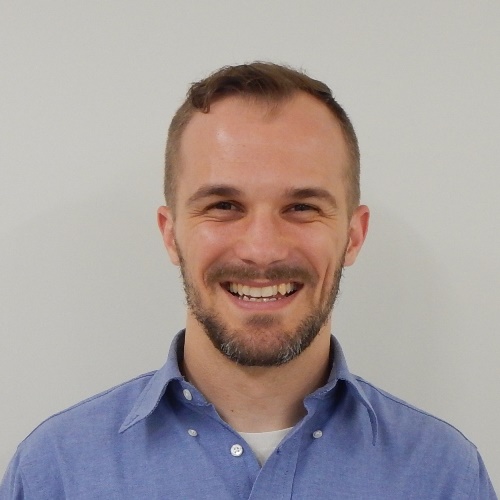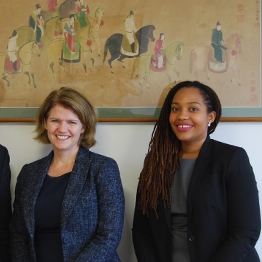KU-GLOCS is the general term referring to various globalization initiatives by Kanazawa University,
including its participation in the Top Global University Project (Super Global Universities).
KU-GLOCS
KU-GLOCS is the general term referring to various globalization initiatives by Kanazawa University,
including its participation in the Top Global University Project (Super Global Universities).
YOU & KU-SGU
"!" and KU-SGU
As Kanazawa University responds to globalization, it introduces a wide range of surprises (!),
unrestricted by existing boundaries.


Tufts University
International Student and Scholar Advisor, Internatiolnal Center
Patrick HIMES
As part of the globalization for administrative staff, Kanazawa University started a program for staff training, which sends administrative staff to selected partner institutions. In FY2015, 2 staff members have been sent to Tufts University (USA) and 2 others have been sent to Ghent University (Belgium.) In order to enhance mutual exchange, we started to accept administrative staff from those partners. The first trainee, Mr. Patrick Himes, a member of the International Center at Tufts University, stayed at Kanazawa University for about a week in late May.
-Is this the first time for you to come to Japan?
No, I’ve been to Tokyo twice. But this is the first time I’ve come to Kanazawa. Kanazawa is very different from Tokyo. It’s very beautiful, and I like it. You can go to the city if you want, or you can be in a nice, less crazy area like Kakuma Campus.
-What is your impression about our campus?
The campus is really beautiful, and there are so much green around here. It’s a big campus, but I don’t think it’s too big. I didn’t feel nervous about going around, because it’s an easy campus to learn and remember where everything is. There are bridges linking each area, so it’s easy to travel. I think it’s really pedestrian-friendly, very people-oriented campus.
As the campus is on hilly location, it’s really interesting to see changing elevation. The view from Sumire-tei restaurant was very nice. We don’t have a view like that in Tufts. Also, the foods offered in cafeterias are nice and cheap.
-I heard from a colleague went to Tufts for staff training that you have to pay for about $12 for lunch at cafeteria in Tufts.
Yes, it’s too expensive. So, I pack my lunch and bring it from home.
-What are you responsible for at the International Center?
I provide immigration services to international students and scholars. In May and June, we’re very busy with immigration, because we have to create all the new documents for three to four hundred new students through the summer. Also, the students who are graduating apply for work authorization, and then any student who wants to do an internship applies for authorization. Scholars like faculty are coming throughout the year.
-What brought you to Tufts?
After I graduated from university, I went to Kyrgyz Republic as a volunteer English teacher through the U.S. Peace Corps, and stayed there for 2 years. When I was in Peace Corps, I learned how to communicate in cross cultural environment, and I realized that I like working with international populations. After I came back to the U. S., I was doing another job in Pennsylvania. But the job wasn’t a good fit for me, and I wasn’t happy with that. Then I decided to pursue a master’s program in intercultural relations in a university in Boston, because I didn’t want to waste the experience in Kyrgyz Republic. It was the correct decision. I wanted to work in a university because I like the people-to-people skill and I feel like I’m good at that. First I became an intern in the International Center in Tufts, and after 8 months I got hired as a full-time employee.
-So this is the ideal job for you! Tufts University has been cooperating with Kanazawa University in Kanazawa University Super Global ELP (English Language Programs) Center, which is one of the featured initiatives of the KU TGU Project. You visited the center and watched some classes for students who wish to study abroad.
Yes. Jamie’s classes were very active. (*1) The topic on that day was about essay writing, and it’s not an exciting topic. However, Jamie was able to get the students communicating, talking and being really active. Definitely the classes were more active than mine in Kyrgyz Republic. He said he thinks the students are getting more active. 6 students from Lehigh University were also joining the classes. They are attending the 6-week program for future English teacher, so they had a lot to learn. I think if more international students join English classes, the classes will be more active. Also, students are able to learn culture as well as language. Besides the academic aspect, it will be a good place for Japanese students and international students to become friends. I talked with a Tufts student who has been in KU as an exchange student from April. He said that Kanazawa University had been excellent and he seemed pretty adjusted. He said that he had a lot of friends of international students, but it’s a little difficult to make Japanese friends. So I think it’s good to offer a lot of opportunities for Japanese students and international students to mix and mingle.
– In March 2016, “Global Communication Studio/Corner” were opened in the three university libraries. We hope the students from various countries will gather in these places and communicate in various languages. Kanazawa University has been striving to increase the number of international students like Tufts University. What does Tufts do to attract international students?
To attract future applicants, our admissions team puts a lot of effort into cooperation with alumni. For example, one of the admission team members is responsible for Massachusetts, New Hampshire and China. Since they had a good experience at Tufts, they help create relationships with high schools and promote Tufts. My boss went to London in April for a big gathering of international alumni. One of her focuses is helping to improve the network of international alumni. She met 50 to 60 alumni not only from Europe but also from some other parts of the world, and many of them are very successful. They will help to improve the reputation and brand of the university. So, it’s important to keep a relationship with alumni.
– Kanazawa University Collaborative professor, or collaborative associate professor, is a title conferred to an individual belonging to overseas institute of higher education who is an alumnus of KU or had conducted research at KU. They help promote international exchange activities, recruit students, follows up on exchange students at destination countries, etc. We have to enlarge and improve their network.
Can I hear about support for international students at Tufts?
Every aspect of university, such as student support, counseling and dining, can be an important factor to bring more international students. And every department is involved. For example, we are very supportive of them from before they arrive by having a lot of contacts mainly about immigration matters. We try to create good relationships with students. Also, we have about 10 mental health and well-being counselors, and they are very busy. I think two thirds of the entire students in Tufts go to see them at least once in their campus life. Though it’s fully accepted in the U.S. to go to counseling, international students from certain cultures think it’s not appropriate or even that it can be viewed as shameful. So, we want them to understand how counseling is viewed in the U.S. and to use these services.
-Since October 2015, a full-time counselor(*2) has been providing counseling to international students in English. We’d like international students to go to counseling without any hesitation.
It’s obviously good to learn from other universities in Japan that have big numbers of international students, or from relationships with Tufts. KU staff who have been to Tufts and Tufts staff coming from Tufts will be great resources. It’s easy for host universities not to see some of the problems for international students, because we are so used to our own way of life. I think it’s really good that we have these exchanges.
-I think so, too. We hope we can continue fruitful exchanges. Let me ask the last question. In KU Top Global University Project, it’s quite important to improve the English skills of students, faculty and staff. How can we improve our English skills?
As a former teacher, the most important thing is that you should never be afraid to use English and be worried about being wrong. I think English is nice, because you can make a lot of mistakes in English and still be understood. So you just have to talk and to build confidence speaking English.
-I see. We shouldn’t be obsessed with trying to speak correct English. Thank you very much for talking with me today!
(Interviewed in May 2016)
*1 Click HERE for Jamie’s interview.
*2 The counselor’s interview can be found in KU-SGU Newsletter Vol.6.
Look more other posts in this category
-
Tufts University
International Student and Scholar Advisor, Internatiolnal Center
Whitney SULLIVAN -
Faculty of Foreign Language Studies, Institute of Liberal Arts and Science
Associate Professor
Mark HAMMOND -
Tufts University
Office of Student Affairs
Mary Patricia MCMAHON and Nandi BYNOE -
Kanazawa University Super Global ELP Center
Assistant Professor
James ROSENBERG -
*Taking the program at the Kanazawa University Super Global ELP Center*
Professor, Faculty of Electrical and Computer Engineering, Institute of Science and Engineering
AKITA Junichi




